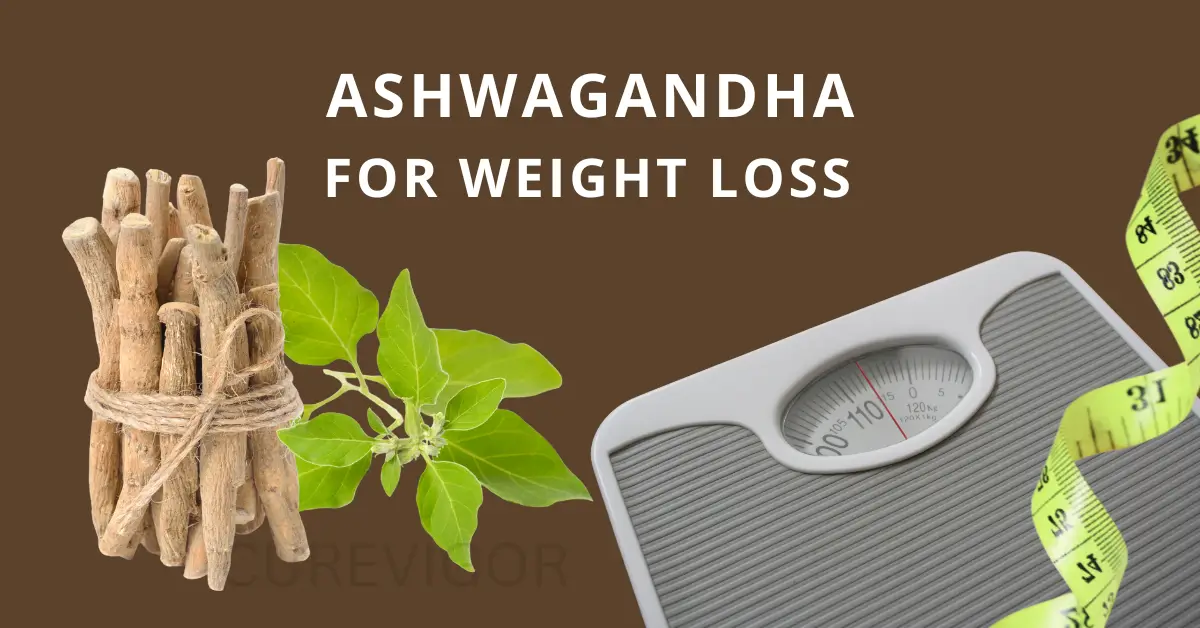Learn how to use ashwagandha for weight loss with proven tips and expert advice. Find out how this powerful adaptogen helps with stress, fat loss, and female-specific benefits.
Thank you for reading this post, don't forget to subscribe!- Are you actively seeking natural and holistic ways to manage your weight?
- Have you identified stress as a significant factor in your weight gain? Are you looking for a solution that addresses the root cause, not just the symptoms?
- Are you already using dietary supplements for your health?
- Are you looking for information on proper usage, dosage, and safety?
- It’s important to note that supplement needs can vary based on individual factors such as age, health status, or any medications you may be taking. This ensures that the guidance is tailored to your specific needs rather than a one-size-fits-all approach.
- Are you considering ashwagandha for weight loss?
How does ashwagandha work: Based on Research
You have tried every diet, every workout, and yet the scale won’t budge. It’s frustrating, and what if the real culprit isn’t what’s on your plate, but what’s on your mind? The constant deadlines, the endless to-do list, the quiet hum of anxiety—it all adds up.
This chronic stress often triggers a hormonal cascade, making your body cling to every single pound. But what if there was a way to break that cycle? Enter ashwagandha, an ancient herb that doesn’t just promise to melt fat, but instead, works to get to the root of the problem, helping your body find its natural balance again.
How to Use Ashwagandha for Weight Loss
Struggling with stubborn weight gain even though you’re watching what you eat and staying active? Stress could be the hidden factor sabotaging your efforts. Elevated stress hormones, emotional eating, and disrupted sleep all play into weight issues.
This is where ashwagandha, an ancient Ayurvedic herb known for its adaptogenic properties, steps in. Research shows it can help reduce stress, balance hormones, and support sustainable weight loss.
Now that you know why stress impacts weight, let’s break down how ashwagandha really works and how you can use it to reach your goals.
Section 1: The Science Behind Ashwagandha and Weight Loss
Cortisol Control: How Stress Hormones Affect Weight Gain
Cortisol is often called the “stress hormone,” and for good reason. When you’re under pressure—whether from work, lack of sleep, or emotional stress—cortisol levels spike. While short-term cortisol can help you stay alert, chronic high cortisol leads to stubborn belly fat storage, constant fatigue, and increased appetite.
Does Cortisol Really Cause Belly Fat?
Yes. Studies show that elevated cortisol encourages the body to store fat in the abdominal region. This is why people dealing with constant stress often notice weight gain around the midsection, even if their diet hasn’t changed much.
How Ashwagandha Helps Lower Cortisol
Multiple clinical studies have found that ashwagandha supplementation can reduce cortisol by up to 30%. These studies were often conducted with adults over periods of 8-12 weeks. By bringing stress hormones back into balance, ashwagandha helps minimize belly fat storage, improve mood, and restore natural energy levels. If stress has been the hidden roadblock in your weight loss journey, this herb could be the missing piece.
Cravings & Emotional Eating: Breaking the Stress Cycle
Stress doesn’t just change how your body stores fat—it also changes how you eat. Elevated cortisol drives cravings for quick energy foods like sweets, fried snacks, and refined carbs. These foods spike blood sugar, giving you a temporary energy boost, but they also cause crashes that leave you hungrier than before.
Why Stress Eating Happens
Stress activates the brain’s reward system, making sugary or salty foods feel more satisfying than usual. Over time, this pattern leads to emotional eating, weight gain, and even food addictions.
Ashwagandha for Cravings and Appetite Control
Ashwagandha helps calm the body’s stress response, which reduces the emotional triggers behind overeating. It also supports healthy neurotransmitter activity, including serotonin and GABA, which promote relaxation and a stable mood. The result? Fewer binge episodes, less reliance on comfort foods, and more consistent appetite control.

Metabolism & Energy: Boosting Your Body’s Fat-Burning Potential
Even if you eat clean, a sluggish metabolism can make weight loss frustrating. Stress and high cortisol interfere with thyroid function, slowing down the body’s calorie-burning engine. This not only makes fat loss harder but also leaves you drained of energy.
Ashwagandha and Thyroid Health
Research shows that ashwagandha supports thyroid function by balancing hormones like T3 and T4. For people with borderline or stress-induced thyroid sluggishness, this adaptogen may help restore metabolic balance, making weight management easier.
Energy, Performance, and Endurance
Beyond metabolism, ashwagandha has been linked to improved mitochondrial function, which enhances cellular energy production. Studies also suggest it can increase strength, endurance, and recovery in athletes. That means more stamina during workouts, less post-exercise fatigue, and a higher overall calorie burn.
When paired with regular exercise, ashwagandha can act as a dual support system: boosting energy levels while helping the body recover faster, leading to better long-term weight loss results.
Section 2: How Ashwagandha Benefits Female Weight Loss, Hormonal Balance and Fat Management
Women often face a more challenging weight loss journey than men, mainly due to hormonal fluctuations across different life stages. Shifts in estrogen, progesterone, and thyroid hormones can make fat storage—especially belly fat—more stubborn. Stress only magnifies these challenges. Here’s how ashwagandha supports women’s weight loss through each of these hurdles.

Menopause and Belly Fat: Managing Stress-Induced Weight Gain
During menopause, falling estrogen levels are closely linked to increased fat storage around the abdomen. Combine this with stress-related cortisol surges, and many women experience a frustrating increase in belly fat despite healthy eating habits.
Ashwagandha acts as a natural cortisol regulator, helping to blunt the hormonal stress response that drives abdominal fat gain. Clinical trials show significant reductions in cortisol levels in women supplementing with ashwagandha, which translates into less central fat accumulation, improved energy, and better emotional resilience during menopause.
Mood, Cravings, and PMS: Breaking the Emotional Eating Cycle
Premenstrual syndrome (PMS) and perimenopause can trigger mood swings, irritability, and intense food cravings. These symptoms are not just psychological—they’re tied to hormone fluctuations that impact serotonin and cortisol levels.
Ashwagandha supports balanced neurotransmitters like serotonin and GABA, promoting calmness and reducing the urge to reach for sugary or high-carb comfort foods. By helping to stabilize mood and decrease anxiety, ashwagandha indirectly reduces PMS-related weight gain and makes it easier for women to stay on track with mindful eating.
Thyroid and Hormonal Support: Boosting Metabolism Naturally
Women are more prone than men to thyroid disorders, especially hypothyroidism, which slows metabolism and makes weight loss more difficult. Stress can worsen thyroid imbalances, further lowering energy and increasing fat storage.
Ashwagandha has been studied for its thyroid-supporting properties, particularly in cases of subclinical hypothyroidism. By helping regulate T3 and T4 hormones, it can improve metabolic function and restore energy levels. For women struggling with thyroid-related weight challenges, ashwagandha offers a gentle yet effective way to support overall hormonal balance.
How to Use Ashwagandha for Maximum Weight Loss Results
Knowing the science is only half the battle—the other half is using ashwagandha correctly to maximize its weight loss benefits. Here’s what you need to know about dosage, forms, and timing.
Ashwagandha Dosage for Weight Loss
- Standardized Extract: The most researched dosage is 300–600 mg per day with high-quality extracts like KSM-66 or Sensoril, clinically shown to reduce stress, balance cortisol, and improve energy.
- Root Powder (Churna): Traditional Ayurveda recommends 1–2 teaspoons daily, often mixed with warm milk, honey, or smoothies. It’s less concentrated than standardized extracts but effective with consistent use.
Choosing the Right Form of Ashwagandha
- Capsules: Precise, portable, and taste-free—ideal for consistent daily use.
- Powder: More conventional, adaptable to recipes, although not everyone likes its pungent, earthy flavor. Traditional, versatile for recipes, but with a strong, earthy flavor that not everyone enjoys.
- Gummies or Liquid Extracts: Convenient and beginner-friendly, especially for those who dislike swallowing pills.
Each form works as long as it delivers a clinically effective dose. Choose based on your preferences.
Timing: When to Take Ashwagandha for Best Results
- Morning: Great for boosting metabolism, energy, and workout performance.
- Evening: Helps improve sleep quality and lower nighttime cortisol, which can otherwise lead to fat storage.
- Split Dose: Many users find the best results by dividing their dosage—half in the morning and half in the evening—for balanced, all-day support.
Pro Tip: Pairing ashwagandha with a consistent sleep schedule, balanced diet, and regular exercise amplifies its benefits. Ashwagandha is most effective when used as part of a comprehensive weight-management strategy because stress, hormones, and lifestyle are all interrelated.
Section 4: Ashwagandha and Other Adaptogens – A Quick Comparison
Herbs and other natural compounds known as adaptogens aid in hormone balance, energy restoration, and stress adaptation. While ashwagandha is one of the most studied adaptogens for stress-related weight gain, it’s not the only option. Here’s how it stacks up against other adaptogens, especially Rhodiola rosea.
Ashwagandha vs. Rhodiola Rosea for Stress and Weight Loss
- Ashwagandha: Known for calming, cortisol-lowering effects, supporting sleep, reducing stress cravings, and regulating thyroid function—essential for managing stress-related weight gain.
- Rhodiola Rosea: Famous for fighting fatigue, improving endurance, and enhancing mental focus. Rhodiola is beneficial for people who feel drained, mentally foggy, or need an energy lift for workouts.
While both herbs support stress management, ashwagandha is more effective for relaxation and hormone balance, whereas Rhodiola shines as a performance enhancer.
Can You Take Ashwagandha and Rhodiola Together?
Yes, many people combine the two for a balanced adaptogenic stack. Ashwagandha for weight loss brings calm and hormonal balance, while Rhodiola provides stamina and focus. Taken together, they can:
- Reduce stress-related cravings.
- Improve workout recovery and endurance.
- Support both mental clarity and physical resilience.
This synergistic effect makes them a popular duo for holistic weight loss and stress relief.
Section 5: Finding the Best Ashwagandha for Weight Loss
With so many supplements on the market, choosing the best ashwagandha for weight loss can feel overwhelming. Quality matters because potency, purity, and form determine how effective your supplement will be. Here’s what to look for:
1. Look for Clinically Researched Extracts (KSM-66 & Sensoril)
Not all ashwagandha extracts are created equal. KSM-66 and Sensoril are patented, highly concentrated extracts backed by clinical studies.
- KSM-66: Standardized to a high percentage of withanolides (active compounds) with a balanced root extract. Great for stress, energy, and performance.
- Sensoril: A more concentrated version, often stronger at lower doses, making it useful for people with high stress or sleep issues.
2. Third-Party Testing for Safety and Purity
Choose a brand that undergoes third-party testing. This ensures the product is free from contaminants like heavy metals, pesticides, and fillers. Supplements without this certification may not deliver consistent or safe results.
3. Organic Certification for Cleaner Supplements
Ashwagandha is a root-based herb, and roots can absorb chemicals from the soil. Organic certification ensures you’re getting a clean, pesticide-free product, which is especially important for long-term use.
4. Choosing the Right Form: Capsules, Powders, or Gummies
- Capsules: The most popular and convenient option—easy to take daily with no strong taste.
- Powder (Churna): Traditional and versatile. It can be added to smoothies, tea, or warm milk, though it has an earthy flavor.
- Gummies or Liquid Extracts: Beginner-friendly and tasty, but be cautious about added sugars.
5. Avoid Marketing Hype – Focus on Quality Over Claims
Searches for “best ashwagandha for weight loss” often lead to endless product reviews. Instead of choosing based on flashy claims, prioritize:
- Extract type (KSM-66 or Sensoril).
- Dosage transparency.
- Independent lab testing.
- Reputable brands with a clean ingredient list.
With supplements, quality always matters most. A well-formulated ashwagandha delivers results without hype.
Pro tip: For the best results, pair your chosen ashwagandha for weight loss with a consistent routine of stress management, balanced nutrition, and regular activity. Supplements amplify lifestyle habits—they don’t replace them.
Section 6: Important Safety & Side Effects
Ashwagandha for weight loss has been used safely in Ayurvedic medicine for centuries, and modern research confirms that it is well-tolerated for most people when taken at recommended doses. However, like any supplement, it’s not without precautions. Understanding potential side effects and interactions ensures you get the benefits without unnecessary risks.
Mild Side Effects: What Some Users Experience
Most people take ashwagandha for weight loss without problems, but a small percentage may notice:
- Digestive issues such as upset stomach, nausea, or diarrhea.
- Drowsiness or fatigue may occur if taken in higher doses or at the wrong time of day.
- Headaches or mild dizziness in rare cases.
Usually minor, these adverse effects go away when your body gets used to it. Lowering the dosage or transferring to a different form (capsules as opposed to powder) can be helpful if symptoms continue.
Who Should Avoid Ashwagandha?
While ashwagandha is considered safe for healthy adults, some groups should avoid or only use it under medical supervision:
- Pregnant or breastfeeding women: Limited safety research exists for these groups, so it’s best to avoid.
- People with autoimmune conditions:People with multiple sclerosis, rheumatoid arthritis, or lupus should speak with a doctor before using ashwagandha for weight loss because it can boost the immune system.
- Individuals scheduled for surgery: Ashwagandha may interact with anesthesia or medications used during procedures—stop use at least 2 weeks before surgery.
Medication Interactions: Stay Safe with Professional Guidance
Ashwagandha’s ability to influence hormones, immunity, and the nervous system means it can interact with certain medications. Be cautious if you take:
- Thyroid medications: Ashwagandha supports thyroid activity, which can compound the effects of thyroid drugs and cause hormone imbalances.
- Sedatives or sleep aids: Because it has calming effects, combining ashwagandha with these can lead to excessive drowsiness.
- Blood pressure or diabetes medications: Ashwagandha may naturally lower blood pressure and blood sugar, which could amplify the effects of prescribed drugs.
- Immune-suppressing drugs: Since ashwagandha boosts immunity, it can interfere with medications used to reduce immune activity.
Before taking ashwagandha, always get medical advice from your doctor if you are taking any long-term drugs.
Safe Dosage Guidelines for Daily Use of Ashwagandha for Weight Loss
Most studies on ashwagandha use daily doses of 300–600 mg of standardized extract, which are generally safe for up to 12 weeks. Long-term safety beyond this timeframe is still being researched.
Although current findings are promising, it’s crucial to approach extended use with caution. Consider taking periodic breaks from supplementing and consult healthcare professionals for medical check-ins to ensure continued safety. To minimize risks:
- Start with the lowest effective dose.
- Take with food to reduce stomach irritation.
- Avoid exceeding recommended amounts unless guided by a professional.
Ashwagandha for weight loss is a safe and effective adaptogen for most healthy adults, but like any supplement, it should be used wisely. By being mindful of side effects, dosage, and possible interactions, you can enjoy its benefits for stress relief and weight management while keeping risks low.
The Bottom Line
Ashwagandha for weight loss isn’t a magic pill, but it’s one of the most potent natural tools for tackling stress-related weight gain. By lowering cortisol, curbing emotional eating, supporting thyroid balance, and boosting energy, it gets to the root causes, making weight loss tough for many.
For women facing menopause, PMS, or thyroid challenges, ashwagandha helps regulate hormones, making it easier to stay consistent with healthy routines.
Stay consistent with high-quality ashwagandha products to experience the best results. Many women notice changes within 4-8 weeks, so maintaining regular use is key to achieving desired outcomes. Research has focused on standardized extracts such as KSM-66 and Sensoril, which are commonly studied in clinical settings.
“Many studies use daily dosages in the 300–600 mg range, but what’s right for you depends on individual health needs.”Takeaway: Ashwagandha supports long-term weight and stress management. Use it regularly as part of a holistic routine for lasting results.
Remember, while ashwagandha can aid in managing stress-related weight gain, it works best when incorporated alongside healthy eating, regular physical activity, and effective stress management strategies. This comprehensive approach not only empowers sustainable change but also enhances overall well-being.
Read more health tips.
You might love:

